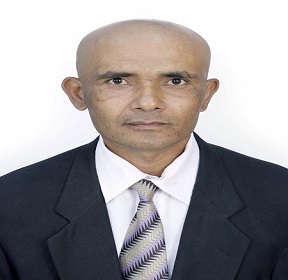
Malik Wajid Hussain Chan
University of Karachi PakistanTitle: Evaluation of Heavy Metal Pollutants in Salt and Seawater under the Influence of the Lyari River and Potential Health Risk Assessment
Abstract:
Heavy metals intoxication through edible salt poses serious health hazards. The conducted research assessed the levels of heavy metals, health risks of salt samples, and the pollution index of seawater obtained from saltpans located at Sandpit, Karachi, Pakistan, which receive untreated effluents through the Lyari River. Seawater (n =27) and salt samples (n = 27) were prepared for the detection of Al, Cd, Pb, Cr, Fe, Cu, Hg, Ni, As and Zn through atomic absorption spectroscopy, mean concentrations ± S.D (mg/mL) were compared with the National Environmental Quality Standards, Pakistan. The levels of Cr (40.06 ± 0.21) were the highest followed by Fe (39.77 ± 0.08) >As (25.12 ± 0.21) >Ni>Pb>Al>Hg>Zn>Cd>Cu. In sea salt (Mean ± S.D mg/Kg), the Cr (47.79 ± 0.19), Fe (47.5 ± 0.15), As (30.62 ± 0.22), and Ni were redundant elements followed by Al>Pb>Hg>Zn>Cu>Cd. The water comprehensive pollution index was 1000 times greater than the critical values. The single factor pollution index was highest for Hg (1321), followed by Cr (40), Ni (36), Pb (32), Al (31.4), Cd (31.3), and As (25). Health risk assessment indices (from salt samples), including target hazard quotient (THQ) for As, Pb, Al, Hg, and Cr were two to six times higher than the noncarcinogenic THQ reference range. Similarly, the hazardous index indicated that salt was 20 times hazardous (HI = 20.29), and the carcinogenic rate index for the heavy metals i.e., Cd, As, Cr, and Ni was above the reference CR value i.e., 1 × 10-4. In conclusion, the experimental and theoretical approaches recommend that the use of contaminated salt may impart health hazards.
Biography:
Dr. Malik Wajid H. Chan has recently (March, 2021), completed his Ph.D from the Centre of Excellence in Marine Biology University of Karachi, Pakistan. He has published 6 articles, in international Esteemed journals. The four (out of six) have been published on the pollution stress and its effects on the local local community and fauna and flora. Some publications are in process. He has done a work on mangroves and oyster conservations in Pakistan. Dr. Chan is working on the effects of pollution stress on the metabolic rate and the biochemistry of the biota.
